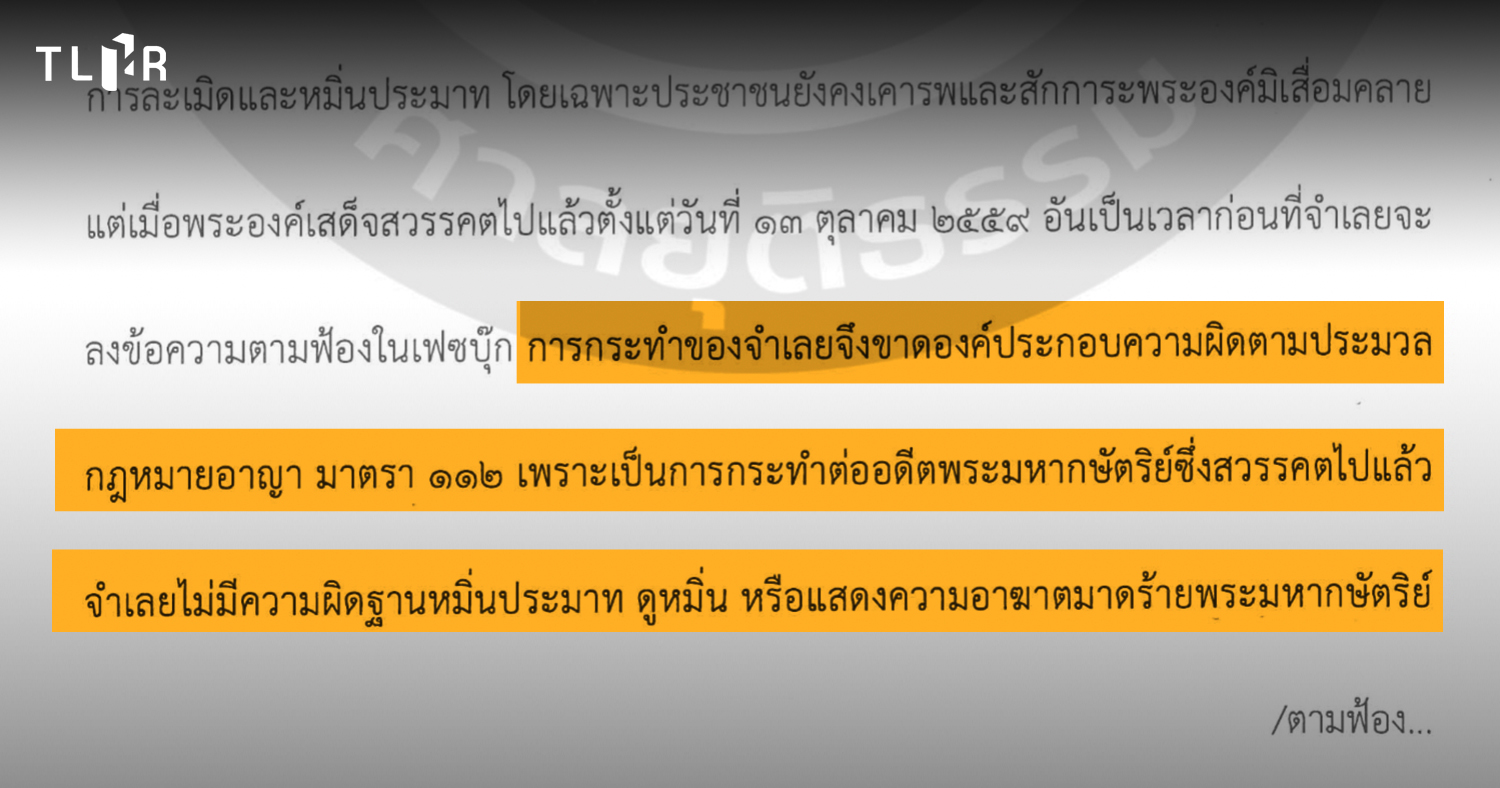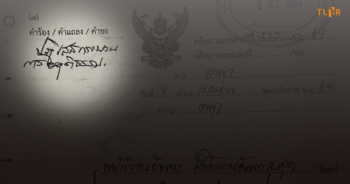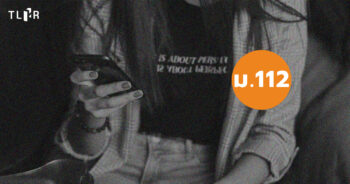On 30 November 2021 9 AM, the Chanthaburi Provincial Court read the verdict of “Jarat (last name undisclosed)”, a 19-year-old freshman student at a university in Chanthaburi province accused of Section 112 of the Penal Code and Section 14 of the CCA for posting a comment criticizing the Sufficiency Economy in “Chanthaburi Page” Facebook group.
In this case, Jarat had to defend himself in a trial for over a year. The Chanthaburi Provincial Court conducted one round of witness examination in the beginning of October involving two Plaintiff’s witnesses and the defendant himself. Point was being made that criticism of a late king did not fall within the scope of Section 112.
Court ruled that “King” pursuant to Section 112 does not refer to a late king.
At 10.00 AM, the judges took to the bench and read the verdict. The Court informed that it had already forwarded the case file and verdict to be reviewed to the Office of the Chief Justice of Region 2.
Then, the Court read the verdict in summary: Considering Section 112 of the Penal Code, which states that “whoever defames, insults, or threatens the King, the Queen, the Heir-apparent or the Regent, shall be punished with imprisonment of three to fifteen years”,
Although it neither states whether the King must be the reigning King at the time of committing the offence or not, nor did it state that the violated King must be the reigning King, the principle of legal interpretation requires that the spirit of law be taken into consideration and interpretation be executed strictly.
Thus, it can be seen that the “King” according to Section 112 of the Penal Code refers to the reigning King at the time of committing the offence, and not a former King that has already passed. Otherwise, one would not be able to locate the scope for the elements of crime.
Furthermore, the facts are heard that the Defendant posted a text on Facebook to express an opinion about the “Sufficiency Economy Philosophy”, which was commonly known to be conceived by the King Rama IX to bestow to Thai people. The wording alluding to Him was considered an insult and defamation, especially because the people still respects and revers him nevertheless. However, since He has passed away on 13 October 2016, before the Defendant’s alleged text was posted on Facebook,
The Defendant’s act thus lacks the elements of crime under Section 112 of the Penal Code because it directed at a late king. Therefore, the Defendant is not guilty of defaming, insulting, or threatening the King as alleged.
As for the offence of an import of data into a computer system related to national security, the Court saw that even though the Defendant’s alleged act, which was the posting of text to the “Chanthaburi Page” group, a private group with a specific purpose that only allowed members to reply to posts, and the alleged text only formed a part of the conversation with other members, the said group had over 196,447 members at the time of committing the offence and was regarded as a group of people.
The word “people” in the Royal Institute Dictionary B.E. 2554 (2011) means citizens, ordinary people who are not civil servants, merchants, or priests. It was also evident that the Defendant posted without genuine understanding of the Sufficiency Economy Philosophy and without care and self-restraint. The nature of the said text could certainly agitate the readers or ordinary people, which could lead to dissatisfaction and might affect the security of the Kingdom.
The Defendant’s act thus is an offence of an import of spurious data into a computer system that is likely to cause damage to the public, which is not an offence of defamation under the Criminal Procedure Code, according to Section 14 (1) of the CCA B.E. 2550 (2007), but not to the extent of the offence of an import of data related to national security under Section 14 (3) of the CCA B.E. 2550 (2007).
It is ruled that the Defendant was found guilty of Section 14 (1) of the CCA B.E. 2550 (2007). Since at the time of committing the offence, the Defendant was 19 years old, the sentence is commuted by one third according to Section 76 of the Penal Code to 2-year imprisonment and 40,000 Baht Fine.
Since the Defendant’s statements during the investigation and the testimony during the examination were favorable to the trial, the sentence is commuted by one third according to Section 79 of the Penal Code to imprisonment of one year and four months and 26,666.66 Baht fine.
It has been deliberated and found that the Defendant is a young student and has committed the offence in this case for the first time. It is found appropriate that the Defendant is given the chance to reform himself. The Defendant’s imprisonment sentence shall be suspended for two years and the Defendant shall be subject to probation, where he has to report himself to the probation officer for four times within the designated period of one year and perform a public service for 12 hours according to Section 56 of the Penal Code. Other charges are dismissed.
The Court abruptly paused the reading half-way and asked officers to check Jarat’s mobile phone for recording.
While the judge was reading the verdict and Jarat was standing listening to it, the court suddenly stopped midway and asked Jarat loudly, “are you recording?”, as he saw that Jarat’s mobile phone screen was emitting light. However, Jarat insisted that he was not doing it. Then, Jarat tried to hand his mobile phone to judicial police for deposit to show his sincerity, but the police did not accept it.
The judge then asked the court room officer to check the mobile phone if it was recording; however, it was found not to be recording anything.
Jarat was released after having paid 26,666.66 Baht in fine. The lawyer is set to appeal because the judge deliberated beyond the scope of prosecutor’s allegation.
After hearing the verdict, the judicial police brought Jarat to be detained at the court’s detention room, while the lawyer and Jarat’s father settled the fine of 26,666.66 baht, paid by Jarat’s family. Soon after, Jarat was released from the detention room and went to report himself to the probation officer for the first time.
After this, the lawyer will submit an appeal against the imprisonment sentence under Section 14 (1) of the CCA because, according to the accusation in this case, the public prosecutor did not specify this paragraph as the alleged offence, but Section 112 and Section 14 (3) of the CCA only. The conviction with Section 14 (1) is therefore outside of the scope of the prosecutor’s accusation.
The difference between Section 14 (1) and (3) of the CCA
Section 14 (1) of the CCA, to which the Court referred to convict and sentence Jarat, concerns the act of “entering wholly or partially spurious Computer Data or false Computer Data into Computer System in a manner that is likely to cause damage to any other person or the public, which is not an offence of defamation under the Penal Code”
Section 14 (3) of the CCA, which the public prosecutor specified as the offence in the allegation and which the Court found the Defendant unguilty of, concerns the act of entering into Computer System any Computer Data which is an offence relating to the security of the Kingdom or terrorism offence under the Penal Code”.
Both paragraphs under this section prescribe a penalty of imprisonment of a term not exceeding five years and fine of not exceeding 100,000 Baht.




